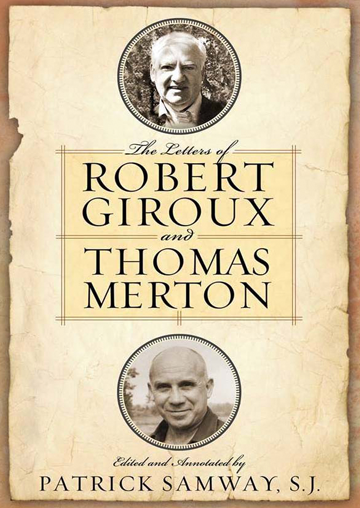The Letters of Robert Giroux and Thomas Merton
Edited by Patrick Samway, S.J.
From the time they first met as undergraduates at Columbia College in New York City in the mid-1930s, the noted editor Robert Giroux (1914–2008) and the Trappist monk and writer Thomas Merton (1915–1968) were destined to be friends. The Letters of Robert Giroux and Thomas Merton captures their personal and professional relationship, from the time of the publication of Merton’s 1948 best-selling spiritual autobiography, The Seven Storey Mountain, until Merton’s untimely death in December 1968. As editor-in-chief at Harcourt, Brace & Company and then at Farrar, Straus & Giroux, Giroux not only edited twenty-six of Merton’s books but served as an adviser to Merton as he dealt with unexpected problems with his religious superiors at the Abbey of Our Lady of Gethsemani in Kentucky, as well as those in France and Italy.
These letters, arranged chronologically, offer invaluable insights into the publishing process that brought some of Merton’s most important writings to his readers. Patrick Samway, S.J., had unparalleled access not only to the materials assembled here but to Giroux’s unpublished talks about Merton, which he uses to his advantage, especially in his beautifully crafted introduction that interweaves the stories of both men with a chronicle of their personal and collaborative relationship. The result is a rich and rewarding volume, which shows how Giroux helped Merton to become one of the greatest spiritual writers of the twentieth century.
Patrick Samway, S.J., a former literary editor of America, the nation’s premier Catholic weekly, is an emeritus professor of English at St. Joseph’s University in Philadelphia. He is the author of Walker Percy: A Life (Farrar, Straus & Giroux, 1997), a New York Times Notable Book; and editor of Percy’s Signposts in a Strange Land: Essays (Farrar, Straus & Giroux, 1991) and A Thief of Peirce: The Letters of Kenneth Laine Ketner and Walker Percy (University Press of Mississippi, 1995). He is the editor, with Ben Forkner, of the noted two-volume anthology Stories of the Old South (1989; rev. ed. Penguin, 1995) and Stories of the Modern South (1977; rev. ed. Penguin, 1986). He is the author of Educating Darfur Refugees: A Jesuit’s Efforts in Chad (University of Scranton Press, 2007). His next book, based on the correspondence of Robert Giroux and Flannery O’Connor, is forthcoming from the University of Notre Dame Press. Among his recent honors is the Newbridge Silver Award presented by the Gerard Manley Hopkins Society at their 30th annual Festival in Newbridge, Ireland, on July 23, 2017.
Reviews
“Robert Giroux, a great editor and publisher, was also a great friend, and Thomas Merton’s correspondence with him—steady, tight in focus, rich in detail, frankly affectionate—makes clear how fully editing and publishing, for Giroux, was an act of friendship. That is no surprise. The surprise is in seeing, through these letters, how deeply Merton’s vast and various body of work was grounded in friendship—in the desire to share all that he had come to know with the people he loved.” —Paul Elie, author of The Life You Save May Be Your Own
“The extensive professional and personal correspondence between Giroux and Merton is here presented with extremely helepful footnotes, biographical introduction, epilogue, and index. … Letters dealing primarily with the business of editing and publishing may not appear to be a promising source of insight, but this collection yields more than might be expected. … Concerning Merton himself, the correspondence mostly confirms what we learn from his journals: his movement from a total concentration on monastic life to a wider engagement with the world in politics, literature, and sprirituality; his restlessness and energy that enabled him to produce a prodigious body of work; his desire to please, which entangled him in countless small enterprises that drew him away from larger projects; and, in the end, his willingness to live under obedience, with all its difficulties, as a monk of Gethsemane. The correspondence shows how hard Merton was willing to work to make his manuscripts better. But it also revelas that he could test the friendship of his editor and publisher by his frequent indecisiveness, inattention, and occasional inability to concentrate.” —Commonweal
“In these letters, readers find the (justifiable) laments concerning censors and religious superiors reluctant to allow publication, often over remarkably trivial concerns. And publishers demonstrated that they could be just as contentious, arbitrary, and capricious as any monastic censor. Several exchanges about racism, war, and literature . . . allow readers to listen in on the wisdom of two astute observers of mid-20th century society.” —Choice
“An important contribution to Merton scholarship. … These letters reveal many hitherto forgotten (or unknown) details behind the creation and publication of Thomas Merton’s books. For instance, Giroux was responsible for the famous opening paragraph to The Seven Storey Mountain that was recently read to the U.S. Congress by Pope Francis. Merton had originally opened the book with an abstract reflection, but Giroux counseled him to cut to the chase and tell the reader immediately who he was and what was at stake in his story. —American Catholic Studies

